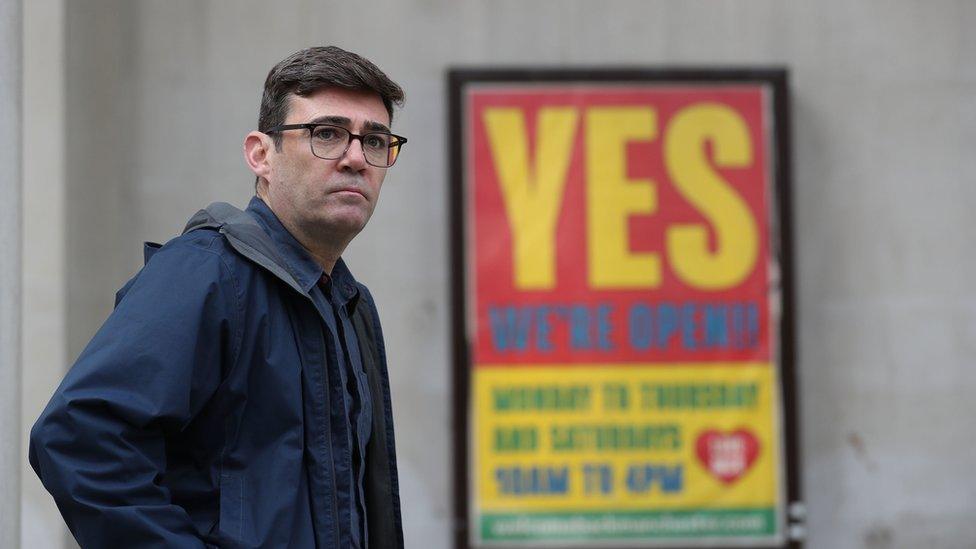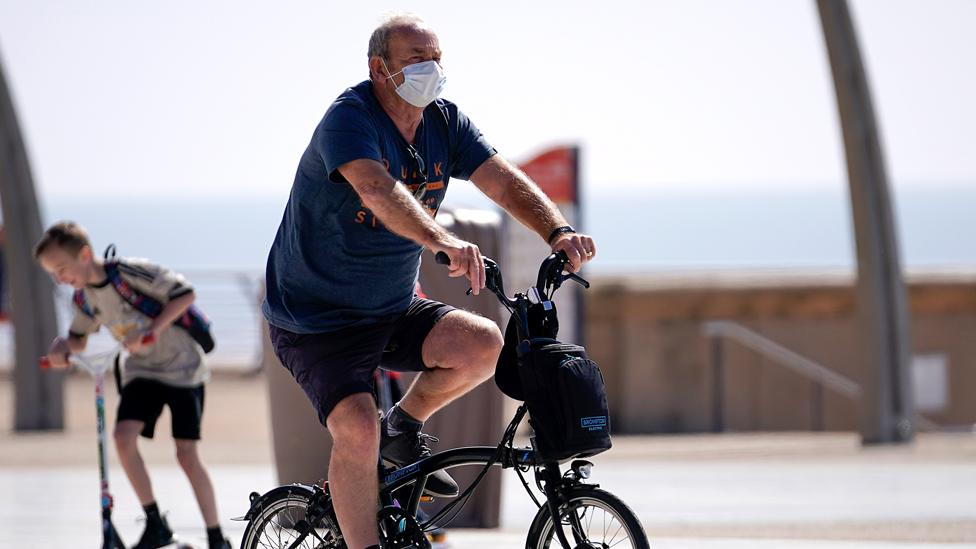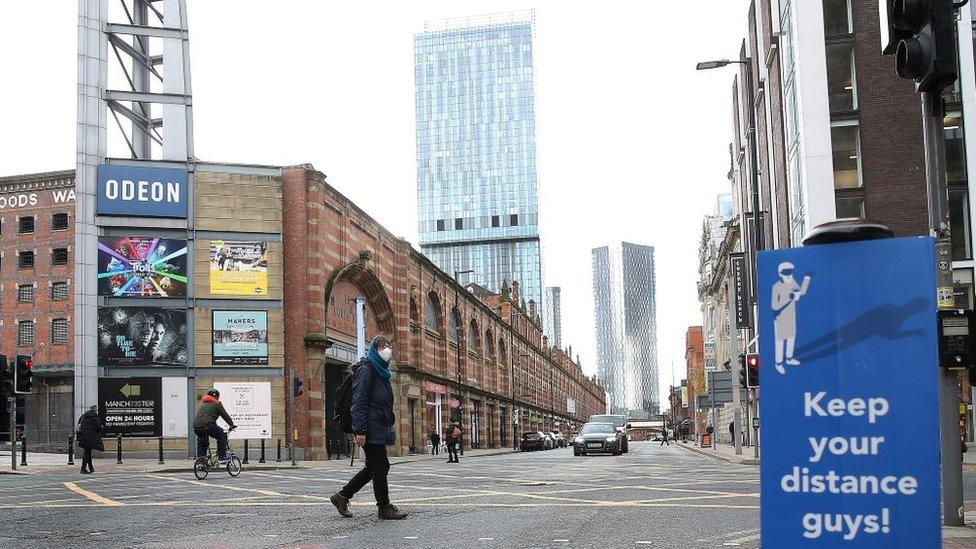Covid: PM warns he may 'need to intervene' on Manchester
- Published
"Time is of the essence" for Manchester - Boris Johnson
Boris Johnson says the spread of coronavirus in Greater Manchester is "grave" and he may "need to intervene" if new measures are not agreed.
The prime minister urged mayor Andy Burnham to "engage constructively" with the government over the region entering "very high" tier three measures.
He said the situation was worsening every day and "time is of the essence".
Mr Burnham, who wants more financial aid for workers affected, said regional leaders will meet No 10 at "any time".
Measures under tier three include pub closures and a ban on household mixing indoors, in private gardens and in most outdoor venues. Liverpool City Region was the first of England's regions to enter the very high alert level.
Lancashire has agreed to move into tier three from Saturday with a financial support package worth £42m. Around 1.5 million people, including those living in Blackburn, Blackpool, Burnley, Lancaster and Preston, will be affected by the new rules.
Speaking at a Downing Street briefing on Friday, Mr Johnson said he understood the "reluctance" of local leaders to put the region under tougher restrictions and said it would be "far from a pain-free course of action".
He warned: "Of course, if agreement cannot be reached I will need to intervene in order to protect Manchester's hospitals and save the lives of Manchester's residents.
"But our efforts would be so much more effective if we work together."
Revealing that a deal had not been reached between No 10 and the region's leaders, Mr Johnson said it was time for action to be taken.
"Each day that passes before action is taken means more people will go to hospital, more people will end up in intensive care and tragically more people will die," he said.
In a joint statement with Greater Manchester's deputy mayors and council leaders, Mr Burnham said they had sought a further meeting with Downing Street officials - and this did not happen.
"We can assure the prime minister that we are ready to meet at any time to try to agree a way forward," they said.
They said they had done "everything within our power to protect the health of our residents" but are not convinced that closing pubs and bars is the only way to protect hospitals.
Instead, they want other measures like shielding to be considered, and tougher penalties on venues that do not comply to Covid regulations, including instant closure powers.
"We firmly believe that protecting health is about more than controlling the virus and requires proper support for people whose lives would be severely affected by a tier three lockdown," they said, adding that the current proposals do not "provide adequate support".

Andy Burnham says northern England has been treated with contempt
The latest government figures showed there were 15,650 new cases reported on Friday, bringing the total to 689,257.
There were a further 136 deaths within 28 days of a positive coronavirus test, bringing the total to 43,429.
Mr Johnson said he hoped the most stringent "very high" restrictions could be lifted as quickly as possible for the affected regions.
He said: "The amount by which we need to reduce the R is not as big as it was right back in the beginning of the spread of this disease.
"If we all work together on the measures we have outlined we can definitely do it."
The reproduction (R) number has risen slightly to 1.3-1.5, with growth of the epidemic still widespread across the country.


The PM said he wanted to avoid another national lockdown "if at all possible" amid calls for a circuit-breaker - a short, limited lockdown - across the country.
He said he disagreed with those who argued in favour of a national lockdown "instead of targeted local action", insisting: "Closing businesses in Cornwall where transmission is low will not cut transmission in Manchester".
Mr Johnson said that while he could not "rule anything out", he wanted to avoid a national lockdown because of "the damaging health, economic and social effects it would have".
The UK government's chief scientific adviser Sir Patrick Vallance said during the briefing that the nation is in a "different situation" from when the Sage group of scientists recommended a two-to-three week national "circuit break" to stop the spread of coronavirus.
He said the situation had changed, adding: "We recommended in September taking a circuit break. The idea there was that actually a two-week interruption would set cases back probably to the levels they were in August and then at those levels, test and trace is more effective to keep control.
"Where we are now is of course a different situation. It's crucial that where the R is above 1 and the numbers are high we get R below 1 for all the reasons that have been outlined, including of course the hospitalisations which are increasing. So it's crucial that's done, and there are a number of ways that can be done."
He added that would only be achieved by combining "tier three baseline conditions" suggested by the government with some extra measures agreed in an affected region using "local knowledge and local insight".
The PM said accepting increased coronavirus restrictions was the "right and responsible" measure to protect the NHS.
He added: "Without action, there is no doubt that our NHS would soon be struggling to treat the sheer number of people seriously ill with Covid.
"Non-Covid treatments and surgeries would need to be cancelled to cope and many more people would die."
Labour's shadow health minister Alex Norris MP said it was "damaging" for Mr Johnson to avoid a full lockdown and that the regional approach is not enough.
"We need this circuit-breaker to give us time to sort these significant problems in testing and tracing," he said. "We've had the worst week last week for tracing. The system's falling over. The prime minister is desperate to avoid lockdown just as he was at the beginning of the pandemic - but we know that that delay at the beginning was really damaging."


On Thursday, London, Essex, York and parts of Surrey, Derbyshire and Cumbria were moved up to tier two and will face tougher measures from Saturday.
More than half of England's population will now be living under high or very high-alert restrictions.
The PM also revealed that the UK is developing the capacity to manufacture millions of new fast turnaround tests for coronavirus - with some saliva tests able to deliver results in 15 minutes.
He said distribution and trials of the tests would start over "the next few weeks" and would enable NHS and care home staff to be tested "more frequently".
Schoolchildren and university students would also be able to be tested, he said, to help keep education "open safely over the winter".

WHAT PLANET ARE WE ON: Sir David Attenborough talks about the impact of the pandemic on tackling climate change
IN NEED OF SOME ESCAPISM?: From the world of Doctor Foster comes Life, a brand new drama on BBC iPlayer

- Published16 October 2020

- Published16 October 2020

- Published15 October 2020
